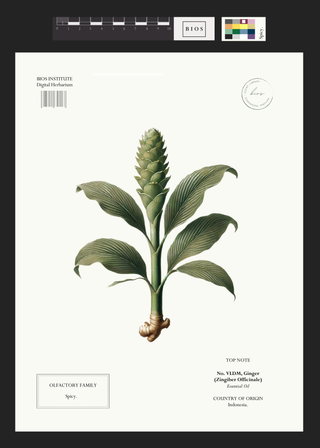

Zingiber officinale, commonly known as ginger, is native to Southeast Asia, particularly the tropical regions of India and China. It is believed to have originated in the area that includes modern-day India, Myanmar (formerly Burma), and other parts of Southeast Asia. Ours is sourced from Indonesia, where it has been present for centuries, likely first arriving through historical trade routes. Over time, ginger became an essential part of Indonesian cuisine, traditional medicine, and cultural practices. Today, ginger is widely cultivated and consumed in Indonesia and is a common ingredient in many Indonesian dishes and beverages.
Ginger has a warm, spicy, and slightly sweet aroma with a subtle hint of freshness. Its distinctive scent is often described as peppery, zesty, and invigorating. The aroma of ginger adds vibrancy, energy, and depth to perfumes.
Ginger is a Top Note in our Spicy family, providing a spicy and warm character to fragrance compositions. It blends well with various fragrance families, including oriental, woody, citrus, and floral. It adds complexity and a touch of warmth to perfumes, making them more inviting and intriguing.
Ginger is also used in perfumery to accentuate and enhance other fragrance ingredients. Its spicy and zesty qualities can add a lively and uplifting effect to floral compositions, while its warmth can provide depth and richness to woody or oriental fragrances.
In summary, ginger is valued in perfumery for its aromatic profile, which adds a spicy, warm, and invigorating touch to fragrances. Its versatility and ability to blend well with other scent ingredients make it a valuable component in many perfume compositions. Culturally, ginger has a rich history and is associated with various positive attributes, making it a cherished ingredient in both perfumery and other domains.
Ginger has been used for centuries in traditional medicine systems like Ayurveda, Traditional Chinese Medicine, and Unani. It is believed to have medicinal properties and is often used to treat digestive issues, inflammation, colds, and nausea. In many cultures, ginger is considered a natural remedy and a symbol of health and well-being.
Ginger is a popular spice in many cuisines around the world. It adds a distinctive flavor and aroma to dishes and is used in both savory and sweet preparations. In some cultures, ginger is believed to have warming properties and is commonly consumed during cold weather to provide comfort and aid digestion.
In certain cultures, ginger is associated with various symbolic meanings. In parts of Asia, ginger is seen as a symbol of prosperity, good luck, and protection. It is often used in traditional rituals, ceremonies, and festive occasions to bring positive energy and ward off negative influences.
Ginger has also found its way into folklore and cultural traditions. For example, in the West, gingerbread houses and cookies are popular during festive seasons like Christmas. In some cultures, ginger is associated with love, romance, and fertility, and is used as an ingredient or gift during wedding ceremonies and celebrations.
In some Asian cultures, ginger is used as a form of traditional etiquette. It is often offered as a sign of respect and hospitality to guests. In Japan, a pickled ginger called "gari" is served alongside sushi to cleanse the palate between different types of fish.
Ginger
- Unit price
- /per
Please note this product format is a small vial that contains roughly 20 drops of scent concentrate. This can be purchased à la carte but is intended to be used with our Perfume Kit.
SCENT SPECIFICATIONS
Latin Name: Zingiber Officinale
Extraction Method: Steam Distilled
Country of Origin: Indonesia
All of the scents in our library our naturally derived - our collection includes essential oils, absolutes, concretes, isolates, enfleurage, macerations, oleoresins, and mixed medium naturals.
Adding product to your cart
Zingiber officinale, commonly known as ginger, is native to Southeast Asia, particularly the tropical regions of India and China. It is believed to have originated in the area that includes modern-day India, Myanmar (formerly Burma), and other parts of Southeast Asia. Ours is sourced from Indonesia, where it has been present for centuries, likely first arriving through historical trade routes. Over time, ginger became an essential part of Indonesian cuisine, traditional medicine, and cultural practices. Today, ginger is widely cultivated and consumed in Indonesia and is a common ingredient in many Indonesian dishes and beverages.
Ginger has a warm, spicy, and slightly sweet aroma with a subtle hint of freshness. Its distinctive scent is often described as peppery, zesty, and invigorating. The aroma of ginger adds vibrancy, energy, and depth to perfumes.
Ginger is a Top Note in our Spicy family, providing a spicy and warm character to fragrance compositions. It blends well with various fragrance families, including oriental, woody, citrus, and floral. It adds complexity and a touch of warmth to perfumes, making them more inviting and intriguing.
Ginger is also used in perfumery to accentuate and enhance other fragrance ingredients. Its spicy and zesty qualities can add a lively and uplifting effect to floral compositions, while its warmth can provide depth and richness to woody or oriental fragrances.
In summary, ginger is valued in perfumery for its aromatic profile, which adds a spicy, warm, and invigorating touch to fragrances. Its versatility and ability to blend well with other scent ingredients make it a valuable component in many perfume compositions. Culturally, ginger has a rich history and is associated with various positive attributes, making it a cherished ingredient in both perfumery and other domains.
Ginger has been used for centuries in traditional medicine systems like Ayurveda, Traditional Chinese Medicine, and Unani. It is believed to have medicinal properties and is often used to treat digestive issues, inflammation, colds, and nausea. In many cultures, ginger is considered a natural remedy and a symbol of health and well-being.
Ginger is a popular spice in many cuisines around the world. It adds a distinctive flavor and aroma to dishes and is used in both savory and sweet preparations. In some cultures, ginger is believed to have warming properties and is commonly consumed during cold weather to provide comfort and aid digestion.
In certain cultures, ginger is associated with various symbolic meanings. In parts of Asia, ginger is seen as a symbol of prosperity, good luck, and protection. It is often used in traditional rituals, ceremonies, and festive occasions to bring positive energy and ward off negative influences.
Ginger has also found its way into folklore and cultural traditions. For example, in the West, gingerbread houses and cookies are popular during festive seasons like Christmas. In some cultures, ginger is associated with love, romance, and fertility, and is used as an ingredient or gift during wedding ceremonies and celebrations.
In some Asian cultures, ginger is used as a form of traditional etiquette. It is often offered as a sign of respect and hospitality to guests. In Japan, a pickled ginger called "gari" is served alongside sushi to cleanse the palate between different types of fish.
